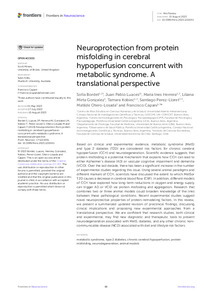Por favor, use este identificador para citar o enlazar este ítem:
https://repositorio.uca.edu.ar/handle/123456789/17277| Título: | Neuroprotection from protein misfolding in cerebral hypoperfusion concurrent with metabolic syndrome: a translational perspective | Autor: | Bordet, Sofía Luaces, Juan Pablo Herrera, María Inés Gonzalez, Liliana Mirta Kobiec, Tamara Pérez Lloret, Santiago Otero Losada, Matilde Capani, Francisco |
Palabras clave: | SINDROME METABOLICO; DIABETES; NEURODEGENERACION; ENFERMEDAD DE ALZHEIMER; DETERIORO COGNITIVO; DEMENCIA | Fecha de publicación: | 2023 | Editorial: | Frontiers Media | Cita: | Bordet, S. et al. Neuroprotection from protein misfolding in cerebral hypoperfusion concurrent with metabolic syndrome: a translational perspective [en línea]. Frontiers in Neuroscience. 2023, 17:1215041. doi: 10.3389/fnins.2023.1215041. Disponible en: https://repositorio.uca.edu.ar/handle/123456789/17277 | Proyecto: | Neuroprotección en asfixia perinatal desde un enfoque traslacional | Resumen: | Abstract: Based on clinical and experimental evidence, metabolic syndrome (MetS) and type 2 diabetes (T2D) are considered risk factors for chronic cerebral hypoperfusion (CCH) and neurodegeneration. Scientific evidence suggests that protein misfolding is a potential mechanism that explains how CCH can lead to either Alzheimer’s disease (AD) or vascular cognitive impairment and dementia (VCID). Over the last decade, there has been a significant increase in the number of experimental studies regarding this issue. Using several animal paradigms and different markers of CCH, scientists have discussed the extent to which MetSor T2D causes a decrease in cerebral blood flow (CBF). In addition, different models of CCH have explored how long-term reductions in oxygen and energy supply can trigger AD or VCID via protein misfolding and aggregation. Research that combines two or three animal models could broaden knowledge of the links between these pathological conditions. Recent experimental studies suggest novel neuroprotective properties of protein-remodeling factors. In this review, we present a summarized updated revision of preclinical findings, discussing clinical implications and proposing new experimental approaches from a translational perspective. We are confident that research studies, both clinical and experimental, may find new diagnostic and therapeutic tools to prevent neurodegeneration associated with MetS, diabetes, and any other chronic noncommunicable disease (NCD) associated with diet and lifestyle risk factors. | URI: | https://repositorio.uca.edu.ar/handle/123456789/17277 | ISSN: | 1662-453X (online) | Disciplina: | PSICOLOGIA | DOI: | 10.3389/fnins.2023.1215041 | Derechos: | Acceso abierto | Fuente: | Frontiers in Neuroscience. Vol.17:1215041, 2023 |
| Aparece en las colecciones: | Artículos Artículos |
Ficheros en este ítem:
| Fichero | Descripción | Tamaño | Formato | |
|---|---|---|---|---|
| neuroprotection-from-protein.pdf | 356,18 kB | Adobe PDF |  Visualizar/Abrir |
Visualizaciones de página(s)
43
comprobado en 27-abr-2024
Descarga(s)
23
comprobado en 27-abr-2024
Google ScholarTM
Ver en Google Scholar
Altmetric
Altmetric
Este ítem está sujeto a una Licencia Creative Commons

